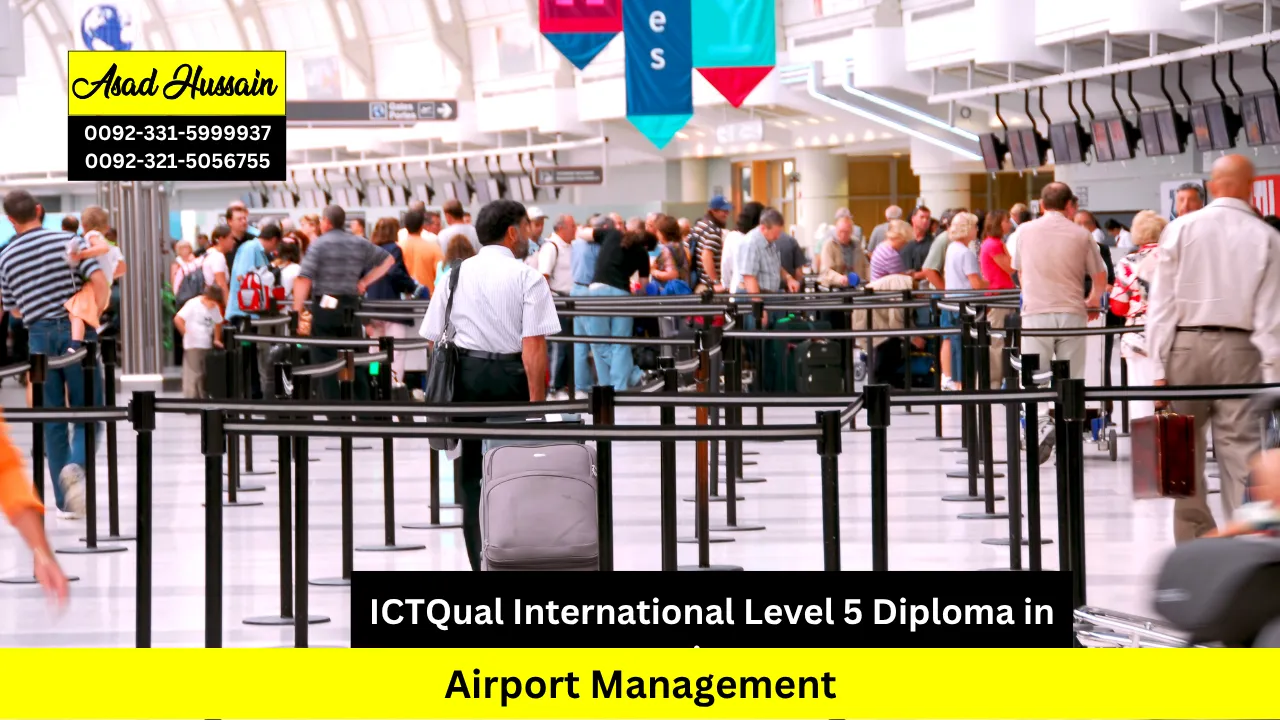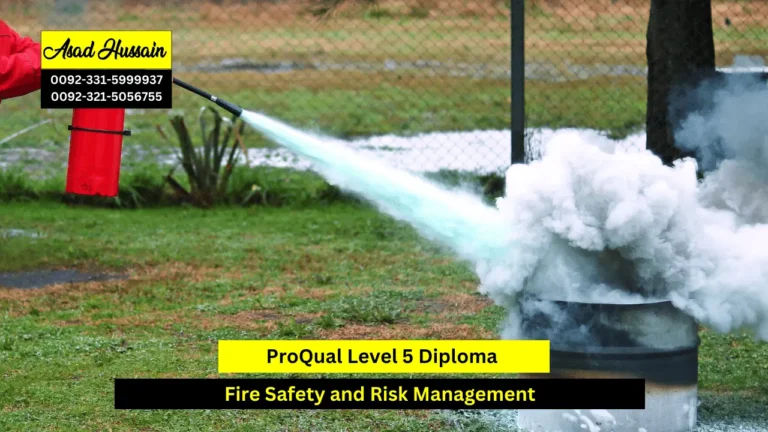The ICTQual International Level 5 Diploma in Airport Management is a globally recognized qualification designed for learners who want to advance their expertise and leadership skills in the aviation and airport sector. Building on the foundations of Level 4, this program provides in‑depth knowledge of airport operations, aviation law, safety and security management, customer service excellence, and strategic decision‑making.
As global air travel continues to expand, the demand for highly skilled airport managers and aviation professionals is greater than ever. This diploma equips learners with the advanced competencies required to oversee complex airport operations, manage diverse teams, and ensure compliance with international aviation standards.
The course is ideal for graduates of Level 4 aviation or business qualifications, current airport and airline staff seeking career progression, and international learners aiming for a qualification that is respected worldwide. With its strong academic framework and practical industry relevance, the ICTQual Level 5 Diploma in Airport Management not only enhances employability but also provides a clear pathway to higher studies, including Level 6 Diplomas and bachelor’s degrees in aviation or business management.
By completing this program, learners gain the confidence to take on leadership roles in aviation. They develop advanced skills in airport and airline management, safety, and customer service. The qualification provides global recognition, opening doors to international career opportunities. Graduates are prepared to excel in one of the world’s most dynamic and fast‑growing industries. This diploma serves as a pathway to both senior roles and higher academic progression.
Program Highlights
Mandatory Units
This qualification, the ICTQual International Level 5 Diploma in Airport Management, consists of 6 mandatory units.
- Strategic Airport Operations and Performance Management
- Airport Finance, Economics, and Revenue Streams
- Risk Management and Crisis Response in Airports
- Airport Marketing, Branding, and Customer Loyalty
- Sustainable Airport Development and Environmental Management
- Leadership and Organisational Behaviour in Airport Operations
To enroll in the ICTQual International Level 5 Diploma in Airport Management, applicants are expected to meet the following criteria:
- Age Requirement: Learners should generally be 18 years or older at the time of enrollment.
- Educational Background: A Level 4 qualification in Aviation Management, Airport Operations, Business, or a related field (such as the ICTQual Level 4 Diploma in Aviation Management or equivalent) is required.
- Work Experience (Preferred): Relevant professional experience in aviation, airport operations, travel, or customer service is highly valued and may strengthen an application.
- English Language Proficiency: Since the program is delivered in English, learners should demonstrate strong written and spoken English skills, either through previous education or an equivalent qualification.
- Motivation and Commitment: Applicants should show a genuine interest in airport and aviation management, along with the ability to complete both theoretical and practical aspects of the program.
Learning Outcomes for the ICTQual International Level 5 Diploma in Airport Management:
Strategic Airport Operations and Performance Management
- Understand the strategic frameworks used to manage airport operations efficiently.
- Analyse performance indicators and implement systems for continuous operational improvement.
- Develop strategic plans that align airport objectives with international aviation standards.
- Evaluate key factors influencing airport capacity, productivity, and service delivery.
- Apply advanced problem-solving skills to optimise airport processes and resource utilisation.
- Assess the role of data analytics in decision-making and operational forecasting.
- Integrate performance management tools to achieve safety, efficiency, and customer satisfaction.
- Demonstrate strategic thinking in managing airport functions and responding to industry challenges.
Airport Finance, Economics, and Revenue Streams
- Understand financial management principles and their application in airport operations.
- Analyse airport cost structures, revenue sources, and budgeting processes.
- Evaluate economic models affecting airport profitability and sustainability.
- Develop strategies to diversify income through non-aeronautical revenue generation.
- Interpret financial statements to support data-driven decision-making.
- Assess the impact of global market trends and economic policies on airport economics.
- Apply techniques for cost control, financial forecasting, and investment planning.
- Demonstrate understanding of fiscal responsibility and accountability in airport management.
Risk Management and Crisis Response in Airports
- Identify potential risks affecting airport operations and safety.
- Develop and implement risk assessment and mitigation strategies.
- Understand the principles of crisis management and emergency planning in aviation.
- Evaluate the effectiveness of airport crisis communication and response systems.
- Coordinate with internal and external agencies during operational disruptions.
- Apply international standards for risk management and safety compliance.
- Analyse case studies of crisis incidents to enhance preparedness and resilience.
- Demonstrate leadership and decision-making under pressure during emergencies.
Airport Marketing, Branding, and Customer Loyalty
- Understand the role of marketing and branding in airport business development.
- Develop marketing strategies that attract airlines, passengers, and commercial partners.
- Analyse passenger behaviour and customer experience to enhance satisfaction.
- Implement digital marketing and communication strategies to strengthen brand visibility.
- Evaluate customer loyalty programmes and their impact on airport competitiveness.
- Integrate service quality management with marketing and branding initiatives.
- Use market research to identify opportunities for airport growth and positioning.
- Demonstrate creativity in developing promotional campaigns for airport services.
Sustainable Airport Development and Environmental Management
- Understand the importance of sustainability in modern airport planning and operations.
- Apply environmental management systems to reduce airport ecological impact.
- Analyse international sustainability standards and their relevance to aviation.
- Evaluate strategies for energy efficiency, waste management, and carbon reduction.
- Develop sustainable policies that balance economic growth with environmental responsibility.
- Assess the role of innovation and green technologies in airport infrastructure.
- Promote awareness of sustainability practices among airport stakeholders.
- Demonstrate commitment to environmental stewardship and responsible airport development.
Leadership and Organisational Behaviour in Airport Operations
- Understand leadership theories and their application in airport management.
- Analyse organisational structures and workplace dynamics in aviation environments.
- Develop strategies to enhance motivation, teamwork, and performance.
- Apply emotional intelligence and conflict resolution techniques in leadership roles.
- Evaluate the impact of organisational culture on airport safety and service quality.
- Strengthen communication and decision-making skills for effective leadership.
- Promote ethical practices, inclusivity, and professionalism within airport teams.
- Demonstrate the ability to lead change and innovation in a dynamic aviation industry.
The ICTQual International Level 5 Diploma in Airport Management is designed for ambitious learners and professionals who want to advance their careers in the global aviation and airport sector. This program caters to graduates, current industry staff, career changers, and international learners who aspire to take on senior roles in airport operations, safety, customer service, and strategic management.
1. Aspiring Airport Leaders
- Individuals aiming to move into higher‑level airport management roles
- Learners motivated to develop advanced leadership and decision‑making skills
- Those who want to understand the complexities of international airport operations
- Students preparing for executive responsibilities in airport administration
- Professionals seeking to strengthen their strategic thinking abilities
- Individuals eager to gain international recognition for their qualifications
- Learners who want to stand out in a competitive global aviation job market
- Ambitious candidates preparing for long‑term leadership careers
2. Graduates of Level 4 Diplomas
- Learners who have completed the ICTQual Level 4 Diploma in Aviation or Airport Management
- Students ready to progress to the next academic and professional stage
- Graduates seeking deeper knowledge of airport law, safety, and operations
- Individuals motivated to specialize in advanced airport management topics
- Learners aiming to build on their foundational aviation knowledge
- Students preparing for higher‑level qualifications or bachelor’s degrees
- Those who want to enhance employability with an advanced diploma
- Graduates seeking international career opportunities in aviation
3. Current Airport and Aviation Professionals
- Airport staff aiming for promotion into supervisory or managerial roles
- Airline employees seeking to expand their operational and leadership skills
- Ground handling supervisors preparing for senior management positions
- Terminal operations staff interested in transitioning into management
- Customer service managers looking to strengthen their aviation expertise
- Aviation workers motivated to formalize their industry experience
- Professionals seeking recognition for their skills through a global diploma
- Employees preparing for leadership roles in international airports
4. Travel, Tourism, and Hospitality Professionals
- Travel agents wishing to diversify into airport management
- Tourism professionals aiming to expand their expertise into aviation
- Hospitality workers interested in transitioning to airport operations
- Professionals seeking to understand passenger flow and customer service in airports
- Those looking to strengthen their management and communication skills
- Workers aiming to connect tourism knowledge with aviation practices
- Individuals seeking to expand their career options across related industries
- Professionals motivated to enter a globally growing sector
5. Career Changers and Professionals from Other Fields
- Professionals from unrelated industries seeking a fresh start in aviation
- Individuals motivated to re‑skill for a career in airport management
- Workers looking for a globally relevant qualification to switch careers
- People interested in exploring opportunities in airlines and airports
- Those seeking a stable and rewarding career in aviation management
- Mid‑career professionals aiming to transition into a new industry
- Individuals who want to align their career with a growing global sector
- Professionals eager to gain specialized knowledge for new opportunities
6. International Learners and Global Professionals
- Students from different countries seeking a qualification with global recognition
- Learners aiming to meet international aviation and management standards
- Individuals preparing for careers in multiple regions worldwide
- Those who want a qualification accepted across borders
- Learners interested in networking with peers from diverse backgrounds
- Students motivated to pursue higher studies abroad in aviation management
- Professionals seeking to expand their career mobility internationally
- Individuals aiming to work in multinational aviation organizations
7. Future Aviation Entrepreneurs
- Ambitious individuals planning to establish airport‑related businesses
- Learners motivated to become consultants in airport management
- Professionals aiming to develop entrepreneurial skills in aviation
- Those who want to understand the business side of airport operations
- Individuals preparing to manage aviation service companies or startups
- Learners seeking to combine leadership with innovation in aviation
- Professionals motivated to contribute to the growth of global aviation
- Future leaders determined to shape the future of the airport industry







